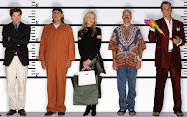
Stanley Kubrick would have turned 80 two days ago, so I have compiled some essays from his textual website. All of the essays are worth reading, but something in each of them caught my eye. And I apologize that most of them are for 2001, but it's the greatest movie ever made and deserves any and all discussions about it.

2001 and the Motif of the Voyage by Claudia Zimny -- quite an extensive look at the fascination of voyages, linking back to Odysseus and Theseus, but also HAL's obsession with the mission.
The Case for HAL's Sanity by Clay Waldrop -- talks about the chess game, conversations concerning the failing AE-35 unit, and the threat of disconnection.
Comments on 2001 by Margaret Stackhouse -- presented in outline format, Kubrick said of Stackhouse's observations that they "are perhaps the most intelligent that I've read anywhere, and I am, of course, including all the reviews and the articles that have appeared on the film and the many hundreds of letters that I have received." Stackhouse discusses the monolith, HAL, and themes of 2001.
2001 and the Culture of Youth, a Newsgroup discussion -- this is the essay I would like to have written. (But for fun, here are the directions for the Zero Gravity toilet.)
Another Odyssey: Design and Meaning in 2001 by Mark Martel -- the most interesting part is about the mythos of the Cylop's eye and how it relates to HAL and A Clockwork Orange.

A Clockwork Orange and the Aestheticization of Violence by Alexander Cohen -- very interesting.
Kubrick, King, and the Ultimate Scare Tactic by Michael Dare -- in discussing The Shining, Dare notes that Kubrick does not go for cheap rushes of adrenaline. It doesn't matter the audience doesn't scream when Jack throws his ax into the bathroom door; what's scary is that Jack has an ax and is trying to kill his family. Also, it includes multiple-viewing observations at the bottom (did Jack kill the twin girls?).
The Shining and Transcendence, a conversation between Tim Fulmer and Rod Munday -- interesting ties to Buddhism and the Minotaur. They also conclude that intelligence saves lives, which is amusing but very true.
And just for fun, Brian Aldiss's "Super-Toys Last All Summer Long", the story that inspired the vision of A.I..
But if there's anything you read here, read Kubrick's Words and Movies. His aesthetic intelligence will astound you.

This image is from idealist.blinkr.net, and it asks, "Would you want an alarm clock with Jack saying "Here's Johnny" and Shelly Duvall screaming?" Because yes, yes I would.









.jpg)


No comments:
Post a Comment